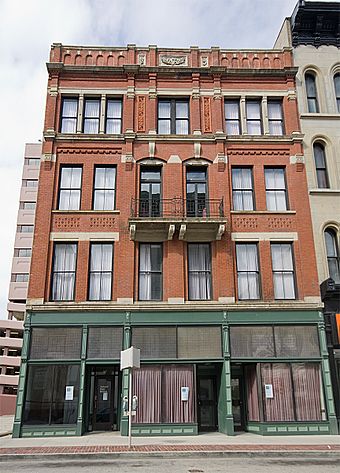Nathaniel Ropes Building facts for kids
Quick facts for kids |
|
|
Nathaniel Ropes Building
|
|

Front of the Ropes Building
|
|
| Location | 917 Main St., Cincinnati, Ohio |
|---|---|
| Area | less than one acre |
| Built | 1882 |
| Architectural style | Queen Anne |
| NRHP reference No. | 82003585 |
| Added to NRHP | September 30, 1982 |
The Nathaniel Ropes Building is a special old building in downtown Cincinnati, Ohio. It's located on Main Street, not far from the Hamilton County Courthouse. This building was constructed in 1882 and is now known as a historic site.
Contents
Who Was Nathaniel Ropes?
Nathaniel Ropes started a business a long time ago, in the early 1800s. His company made things like lard (a type of fat), candles, and other products from oil. He was a businessman who invested in property.
How Did the Building Come to Be?
In 1844, Nathaniel Ropes bought some land in Cincinnati. He built a wooden building there first. This first building stood for 27 years. Later, in 1871, a bigger building replaced it. That second building was then taken down to make way for the building we see today.
It seems Ropes built this new building as an investment. He even bought a bit more land next to his original lot before starting construction. Interestingly, none of the buildings on this spot ever housed Ropes' own business.
What Does the Ropes Building Look Like?
The Ropes Building is made mostly of brick. It also has parts made from sandstone and iron. The front of the building, called its facade, has many fancy details. You can see different materials and shapes used in its design.
Queen Anne Style Architecture
All these details make it a great example of the Queen Anne style. This style is known for its varied textures and interesting shapes. The building's well-preserved look helps it stand out among other old buildings nearby.
Why Is It a Historic Place?
Because of its beautiful and well-kept historic design, the Nathaniel Ropes Building was added to the National Register of Historic Places in 1982. This means it's officially recognized as an important part of history.
 | Calvin Brent |
 | Walter T. Bailey |
 | Martha Cassell Thompson |
 | Alberta Jeannette Cassell |



